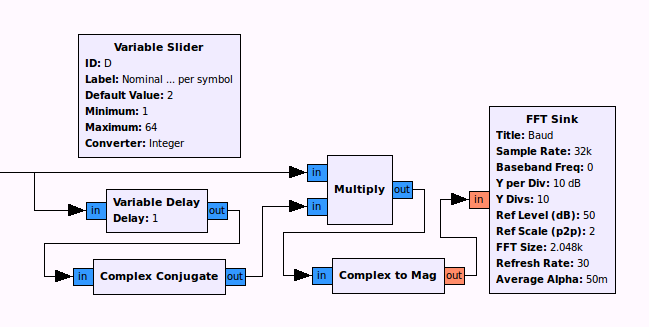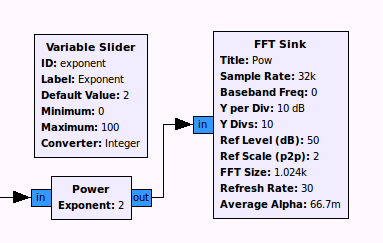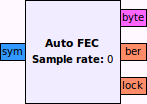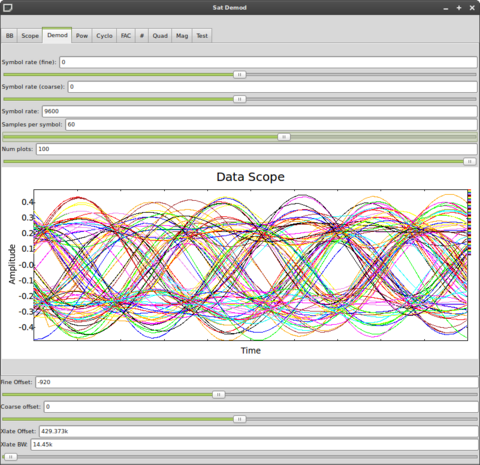Difference between revisions of "Gr-baz"
(→auto_fec) |
m (→lib (C++)) |
||
| Line 23: | Line 23: | ||
Unlike the original gr_delay block that has a fixed delay, this allows for a ''variable'' delay that can be changed at runtime. The delay can be positive or negative. If any padding is required, it uses the value of the last sample. | Unlike the original gr_delay block that has a fixed delay, this allows for a ''variable'' delay that can be changed at runtime. The delay can be positive or negative. If any padding is required, it uses the value of the last sample. | ||
| − | [[File:GRC_Variable_Delay_Cyclo.png | + | [[File:GRC_Variable_Delay_Cyclo.png|center|Using the Variable Delay block to adjust the delay of samples into Complex Conjugate/Multiply blocks in order to find the cyclostationarity of the input signal (i.e. perform cyclostationary analysis to determine the periodicity of the signal to find the symbol or baud rate of the raw modulated data - helpful for blind signal anaylsis).]] |
=== [http://svn.spench.net/main/gr-baz/lib/baz_pow_cc.cc pow_cc] === | === [http://svn.spench.net/main/gr-baz/lib/baz_pow_cc.cc pow_cc] === | ||
| − | [[File:GRC_Pow_Block.png | + | [[File:GRC_Pow_Block.png|center|Using the Power block to determine the order of a PSK signal (i.e. determine the ''n'' of a phase-shift keyed signal, e.g. BPSK, QPSK, 8PSK).]] |
=== [http://svn.spench.net/main/gr-baz/lib/baz_print_char.cc print_char] === | === [http://svn.spench.net/main/gr-baz/lib/baz_print_char.cc print_char] === | ||
Revision as of 12:40, 24 March 2012
Contents
[hide]General
NOTE: A few components will not work (e.g. BorIP client) without applying certain patches to your GNU Radio source. Please see below.
The module name is baz, so in Python one would write:
baz.<block>(args)
To import a file (e.g. borip):
from baz import <file>
Components
patch
Before using various blocks in gr-baz, you must apply at least some of the patches contained in this directory to your GNU Radio source tree. For example: you must update gr_udp_source if you wish to use it as a BorIP client.
lib (C++)
delay
Unlike the original gr_delay block that has a fixed delay, this allows for a variable delay that can be changed at runtime. The delay can be positive or negative. If any padding is required, it uses the value of the last sample.
pow_cc
print_char
puncture_bb/depuncture_ff
swap_ff
test_counter_cc
unpacked_to_packed_bb
agc_cc
python
borip
NOTE: You must apply the appropriate patch to enable BorIP support in gr_udp_source first!
Enables BorIP client support in GNU Radio. Either access this class directly in hand-written Python code, via the GRC block (see below), or enable seamless connection to a remote USRP exposed to your LAN with BorIP server.
To enable seamless support, add the following to gr-usrp/src/__init__.py:
import sys
if not sys.modules.has_key('baz.borip'):
from baz import borip
This tells Python to import borip whenever the Python-bindings for the USRP are requested. BorIP automatically patches into usrp_source_c and will attempt to connect to a BorIP server if no local device is present. The default server address is specified in ~/.gnuradio/config.conf:
[borip] server=<server address>
The other settings are:
reconnect_attempts=<# of reconnection attempts before signalling EOF to the flowgraph, -1 to try forever, default is 0>
reconnect_interval=<seconds between connection attempts, default 5 seconds>
keepalive_interval=<seconds between sending PING keepalive, default is 5 seconds>
verbose={True,False} Verbose mode prints commands sent between client and server
default_port=<TCP and UDP port to use, default is 28888>
If you use the BorIP Source GRC block, the generated code will NOT honour the reconnect_attempts specified in the above config file. Instead it will always take it from the parameter set for the GRC block instance.
auto_fec
Automatically try every combination of FEC parameters until the correct ones are found (determined by monitoring BER output by Viterbi decoder).
This uses the NASA Voyager (k=7) convolutional code.
Leave 'sample rate' parameter at 0 to have it interpret duration/periods as number of samples (this should work fine in all cases anyway). Setting the sample rate will cause it to treat those values at real time.
eye
This draws upon the eye diagram in OP25. The block allows for changing certain sampling/graphical parameters at runtime (see GRC block definition below).
facsink
Please see Fast Auto-correlation.
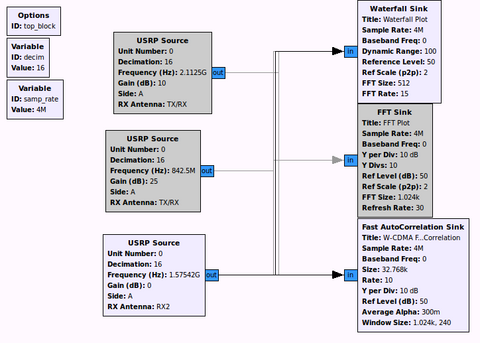
grc
GRC XML block definitions for:
- agc: AGC (Baz) - this is unfinished
- auto_fec: Auto FEC
- borip_source: BorIP Source
- delay: Variable Delay
- puncture_bb/depuncture_ff: Puncture/Depuncture
- pow_cc: Power
- swap_ff: Swap
- test_counter_cc: Test Counter
- eye: Eye Diagram
- facsink: Fast AutoCorrelation Sink
- gr_mpsk_receiver_debug_cc: MPSK Receiver (Debug)
- Requires appropriate patch to gr_mpsk_receiver_debug.cc
Also, this contains patches for GRC to enable 'any' block support. This enables you to use raw GNU Radio blocks by typing in the necessary Python function to create the block (without a dedicated GRC XML block definition). For example: I use it with baz.print_char
- baz_any_source: Any Block Source (for source blocks)
- baz_any_sink: Any Block Sink (for sink blocks)
- baz_any: Any Block (for blocks with I/O)
You can either apply the following two patches, OR apply one from the patch page:
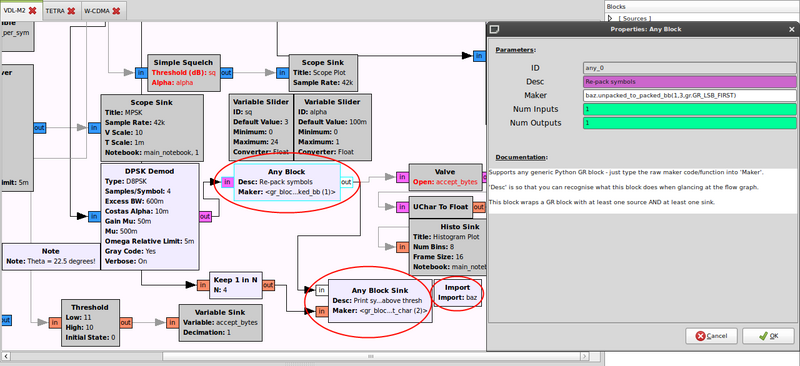
apps
am_fft
Same functionality as usrp_fft.py, however the AM (magnitude) signal is shown instead of the original complex one.
Also allows for changing receive antenna in the GUI.
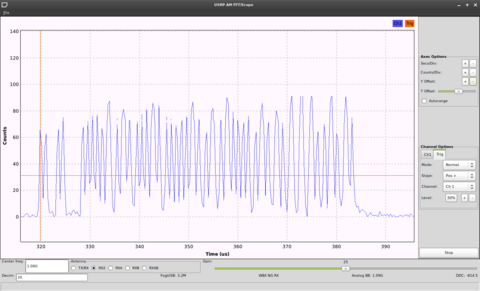
usrp_fac
Stand-alone app for using the Fast Auto-correlation Sink.
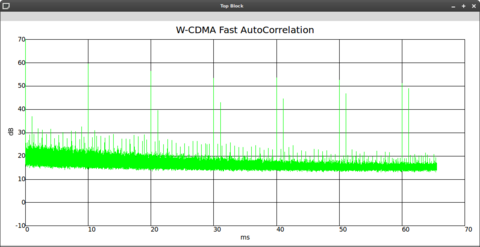
| ||||||||||||||||||||||||||||||||||||||||||||||||||||||||||||||||
